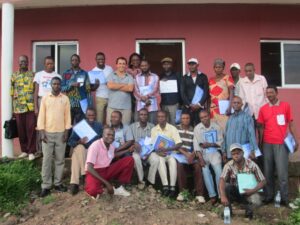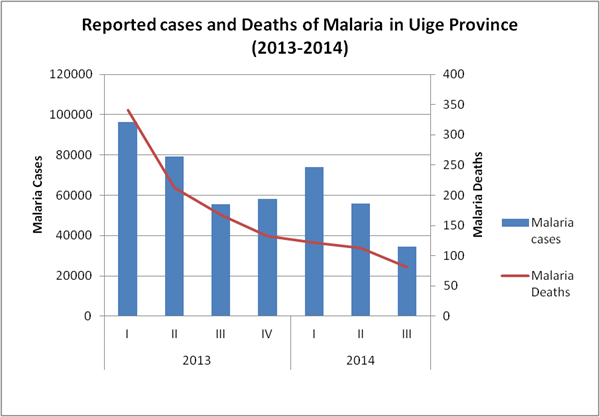
A group of nurses during a malaria case management training in Milunga District, Uige Province, Angola
The entire Angolan population is at risk for malaria, but there is heterogeneity in malaria transmission throughout the country. In Uige, a province in northern Angola, malaria is hyperendemic. Many health workers there have limited capacity and often diagnose any febrile case as malaria, based on clinical diagnosis and not on results from rapid diagnostic tests or microscopy. As a consequence, malaria is frequently misdiagnosed, artemisinin-combination therapy (ACT) is inappropriately dispensed, and the population does not have confidence in the care being provided.
In 2014, the President’s Malaria Initiative (PMI) partners worked with the provincial malaria program to train more than 650 health workers across the province in malaria case management. The trainings focused on improving the overall knowledge and skills required to diagnose and treat malaria correctly. Subsequently, more than 450 support supervision visits were conducted to enhance these skills and improve malaria case reporting. The results have been impressive. As health workers improved their knowledge and practices, Uige Province started to see a decline in malaria morbidity and mortality (see Figure below).
Reported Malaria Cases and Deaths in Uige Province (2013–2014).
While stockouts of rapid diagnostic tests (RDTs) in 2013 did contribute to an increase in reported cases (due to presumptive treatment), the data do demonstrate decreasing numbers of malaria cases and deaths over time. Furthermore, supervisory visits at health facilities confirmed that health workers’ knowledge of how to correctly diagnose and treat malaria improved (see Table below).
Progress in Supervisory Indicators in Uige Province (FY 2014, Q1–Q4)
| Indicator (%) | Q1 | Q4 | % increase |
| % of health professionals who know how to use an RDT | 44% | 81% | 37% |
| % of health professionals who show correct knowledge about fever differential diagnosis | 22% | 51% | 29% |
| % of health professionals who know the correctACT dosage | 41% | 66% | 25% |
| % of health professionals who know when intermittent preventive treatment for pregnant women (IPTp) should be started |
2% | 35% | 33% |
These results give cause for optimism. Although there is still room for further improvement, investments in training, supervision, and planning are yielding results, and malaria cases are declining. Correct diagnosis and reporting is leading to overall improvements in the services that health facilities provide. For example, the appropriate diagnosis of malaria has resulted in prescription of ACTs only for test-positive cases; thus, irrational use of ACTs has been minimized, while the management of non-malaria fever cases has improved.
Training and supervision of health workers are playing a fundamental role in improving malaria case management in Uige Province, contributing to overall improvement of the health system and significant reduction of malaria cases.

